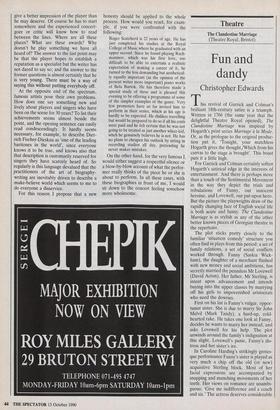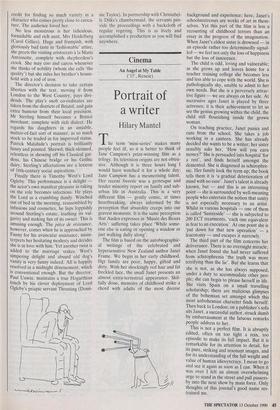Theatre
The Clandestine Marriage (Theatre Royal, Bristol)
Fun and dandy
Christopher Edwards
This revival of Garrick and Colman's brilliant 18th-century satire is a triumph. Written in 1766 (the same year that the delightful Theatre Royal opened), The Clandestine Marriage was inspired by Hogarth's print series Marriage a la Mode. Or, as the prologue to the original produc- tion pit. it, 'Tonight, your matchless Hogarth gives the thought,/Which from his canvas to the stage is brought'. This boast puts it a little high.
For Garrick and Colman certainly soften Hogarth's satirical edge in the interests of entertainment. And there is perhaps more than a touch of the Sentimental Movement in the way they depict the trials and tribulations of Fanny, our innocent heroine, and Lovewell, our put-upon hero. But the picture the playwrights draw of the rapidly changing face of English social life is both acute and funny. The Clandestine Marriage is as stylish as any of the other better known pieces of Georgian theatre in the repertoire.
The plot sticks pretty closely to the familiar 'situation comedy' structure you often find in plays from this period: a set of family relations, a set of social conflicts worked through. Fanny (Saskia Wick- ham), the daughter of a merchant flushed with new money and social ambitions, has secretly married the penniless Mr Lovewell (David Acton). Her father, Mr Sterling, is intent upon advancement and intends buying into the upper classes by marrying off his girls to impoverished aristocrats who need the dowries.
First on his list is Fanny's vulgar, oppor- tunist sister. She is due to marry Sir John Melvil (Mark Tandy), a hard-up, cold- hearted rake. He takes one look at Fanny, decides he wants to marry her instead, and asks Lovewell for his help. The plot unwinds around the family's indignation at this slight, Lovewell's panic, Fanny's dis- tress and her sister's ire.
In Caroline Harding's strikingly grotes- que performance Fanny's sister is played as very much a chip off the old (or new) acquisitive Sterling block. Most of her facial expressions are accompanied by snapping and munching movements of her teeth. Her views on romance are unambi- guous: 'Give me indifference and a coach and six.' The actress deserves considerable
credit for finding so much variety in a character who comes pretty close to carica- ture. The audience loved her.
No less monstrous is her ridiculous, formidable and rich aunt, Mrs Heidelberg (Carol Gillies). Huge and frumpish, with gloriously bad taste in 'fashionable' attire, she greets the visiting aristocrats a la Marie Antoinette, complete with shepherdess's crook. She may coo and caress whenever she thinks of nobility (whom she calls 'the quality') but she rules her brother's house- hold with a rod of iron.
The director's decision to take certain liberties with the text, moving it from London to the West Country, pays divi- dends. The play's snob co-ordinates are taken from the districts of Bristol, and gain extra humour from their local precision. Mr Sterling himself becomes a Bristol merchant, complete with rich dialect. He regards his daughters in an amiable, matter-of-fact sort of manner, as so much stock to be traded in for improved status. Patrick Malahide's portrait is brilliantly funny and pointed. Shrewd, thick-skinned, relentless in showing off his Classical gar- dens, his Chinese bridge or his Gothic dairy, Sterling's affectations are a lexicon of 18th-century social aspirations.
Finally there is Timothy West's Lord Ogleby. This performance is a delight __ the actor's own manifest pleasure in taking on the role becomes infectious. He plays the Lord as a crumbling dandy. Winched out of bed in the morning, reassembled by infusions and cosmetics, he lisps foppishly around Sterling's estate, loathing its vul- garity and making fun of its owner. This is amusing enough. The piece de resistance, however, comes when he is approached by Fanny for his avuncular assistance, misin- terprets her hesitating modesty and decides she is in love with him. Yet another twist is added to the marriage stakes. West's simpering delight and absurd old dog's vanity is very funny indeed. All is happily resolved in a midnight denouement, which is conventional enough. But the director, Paul Unwin, maintains a true Hogarthian touch by his clever deployment of Lord Ogleby's priapic servant Thrusting (Domi-
nic Taylor). In partnership with Christabel- le Dilks's chambermaid, the servants pro- vide the proceedings with a backcloth of regular rogering. This is as lively and accomplished a production as you will find anywhere.



























































 Previous page
Previous page